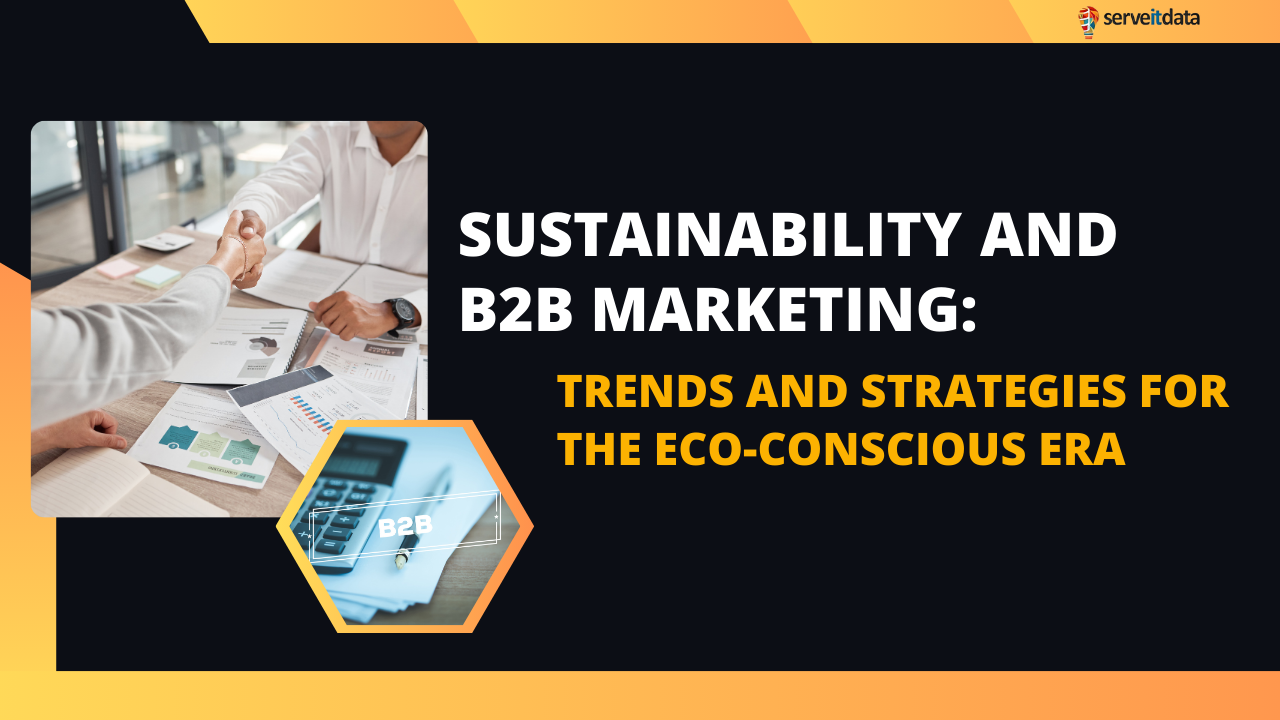Sustainability and B2B Marketing: Trends and Strategies for the Eco-Conscious Era
In today’s rapidly evolving world, sustainability has risen to the forefront of global concerns. This paradigm shift towards environmental and social responsibility has fundamentally altered the way businesses operate and market themselves. This blog explores how sustainability is becoming a pivotal factor in B2B marketing and provides insights into how to incorporate it into your strategies. Leveraging my experience as a senior B2B content writer at ServeIT Data (with previous experience at Forrester), let’s delve into the eco-conscious era of B2B marketing.
The Rise of Sustainability in B2B Marketing
Sustainability, or “green marketing,” has transitioned from a nice-to-have to a must-have in B2B marketing for several compelling reasons:
- Consumer and Stakeholder Demands: Modern consumers and stakeholders are increasingly looking to engage with eco-conscious businesses. They are more likely to trust and invest in companies that demonstrate a commitment to sustainability.
- Regulatory Pressures: Governments worldwide are imposing stricter environmental regulations. Adapting to these regulations is both a legal requirement and a marketing advantage.
- Cost Efficiency: Sustainable practices often translate into cost savings. More efficient energy use, responsible sourcing, and reduced waste contribute to a healthier bottom line.
- Competitive Advantage: Embracing sustainability can provide a significant edge over competitors. Companies that demonstrate a commitment to sustainability can attract a broader customer base.
Incorporating Sustainability into B2B Marketing Strategies
Here are some strategies to infuse sustainability into your B2B marketing practices:
- Sustainable Sourcing: Emphasize your use of sustainably sourced materials or products. Highlight how responsible sourcing contributes to a healthier planet.
- Eco-Friendly Packaging: If relevant, adopt eco-friendly packaging. Promote your use of recyclable, biodegradable, or reusable packaging materials.
- Carbon Footprint Reduction: Share your initiatives to reduce your carbon footprint. Whether it’s through energy-efficient practices or reduced business travel, show how you’re minimizing your impact.
- Transparency and Reporting: Be transparent about your sustainability efforts. Provide regular reports detailing your environmental impact and sustainability goals.
- Product Sustainability: If your products contribute to sustainability (e.g., energy-efficient machinery), highlight these advantages in your marketing materials.
- Collaborate with Eco-Influencers: Partner with influencers who focus on sustainability to reach a broader, eco-conscious audience.
Sustainability Marketing Trends for 2023
To stay at the forefront of eco-conscious B2B marketing, consider these trends:
- Circular Economy Promotion: The concept of a circular economy, where products are reused, repurposed, and recycled, will become a central theme.
- Eco Labels and Certifications: The use of eco labels and certifications, such as Fair Trade or Energy Star, will increase to prove a commitment to sustainability.
- Sustainable Development Goals (SDGs): More businesses will align with the United Nations Sustainable Development Goals, creating a universal language for sustainability.
- Sustainable Tech Integration: Innovations like IoT (Internet of Things) will be used to monitor and enhance sustainability practices in real-time.
- Customization for Sustainability: Businesses will tailor their sustainability messages to specific customer needs and desires, creating a more personalized marketing approach.
- Purpose-Driven Marketing: Highlight your company’s purpose and values. Let customers know your deeper mission to create a more sustainable future.
In Conclution, Sustainability is no longer an optional feature in B2B marketing; it’s a fundamental requirement. Aligning your marketing strategies with sustainability can boost your brand’s reputation, attract more customers, and contribute to a better future for our planet. By staying up-to-date with emerging sustainability marketing trends, incorporating eco-friendly practices, and being transparent about your efforts, you can thrive in this eco-conscious era of B2B marketing.


